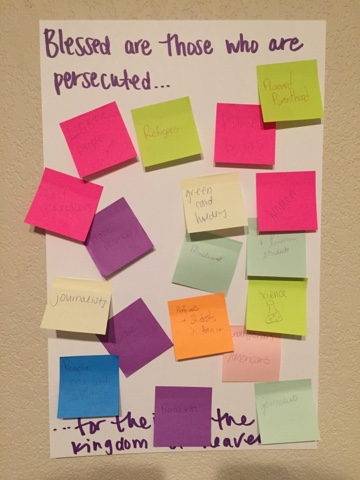Grace and peace from God our Creator, hope in our Redeemer Jesus the Christ, and the promised gifts of the Holy Spirit are with you, always.
It’s been quite a week in our nation, hasn’t it? Last week, the President signed several Executive Orders that sent vulnerable Americans—and incoming immigrants and refugees—into a state of panic. Many responded in protest. Are your social media feeds full of photos of people swarming airports, or folks urging you to call your representatives in Congress? Americans in opposition to the policies of the new administration have been deeply motivated to engage in our ongoing civic responsibilities. This is encouraging those of us interested in change.
In the last week or so, my social media feeds had more Bible verses strewn across them than any time I can remember. Leviticus 19 made the rounds: “When a foreigner resides among you in your land, do not mistreat them. The foreigner residing among you must be treated as your native-born. Love them as yourself, for you were foreigners in Egypt.” As we grapple with a new national policy of barring entry for refugees, immigrants from majority-Muslim nations—and the policies keep changing each day as they are challenged—we, as Christians, must make a decision. To whom do we pledge our allegiance? First and foremost, we pledge our allegiance to the Triune God. Somewhere down the line we pledge our allegiance to the republic. So when we see people in immigration detention centers—children, the elderly, separated families—to what wisdom do we turn? Quote unquote National Security? Or the Law of Moses?
As always, Jesus has words for us. Jesus has guidance, and Jesus has expectations. He lays those out for us in today’s lesson from the Gospel according to Matthew. Some weeks, I pick a pretty small piece of our scripture lessons to drive home the point I think the whole thing is pointing us toward. This week, you’d have to try pretty hard to skirt the issue.
These verses are what we call the Beatitudes, part of a larger Sermon on the Mount. Are you familiar with them?
Blessed are the poor, for theirs is the kingdom of heaven.
Blessed are those who mourn, for they will be comforted.
Blessed are the meek, for they will inherit the earth.
Jesus was talking to people who did not believe this. He was talking to people who needed to be told that the poor, and the meek, and the brokenhearted were blessed—because when they looked around them, the opposite seemed truer. When you look around, who do you see? Who do we look past?
Emily Scott, a pastor at St. Lydia’s dinner church in Brooklyn, NY, recently posted on Facebook some updated beatitudes for our present day. She and members of her community wrote them on the protest signs they carried to the Women’s March on Washington:
Blessed are those who cry “Black Lives Matter”
Blessed are the indigenous, and their sovereign sacred lands.
Blessed are those with pre-existing conditions.
Tonight, I want to offer you a similar opportunity. You have already noticed the posters stuck on the wall, and the little post-it notes, and the pens. Another Pastor Emily that I know gave me this idea. It is written in the fifth chapter of the gospel according to Matthew and on those posters:
Blessed are the peacemakers, for they will be called children of God.
Blessed are those who hunger and thirst for righteousness, for they will be filled.
Blessed are those who are persecuted for righteousness’ sake, for theirs is the kingdom of heaven.
Take a few moments to think about who, today, are these about. Who in your community, here? Who at UC Davis? Who in this city? Who in our state? Who in our country? Who in our world?


